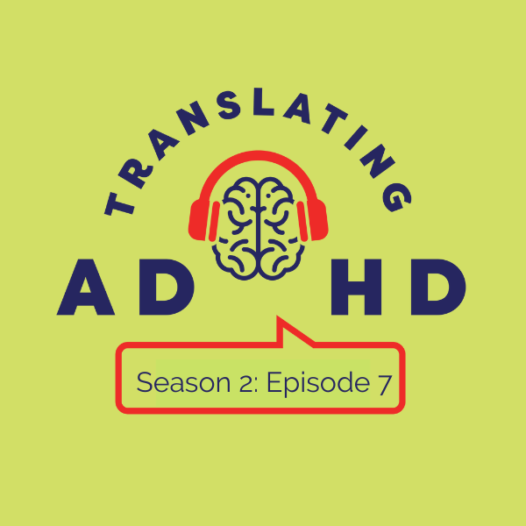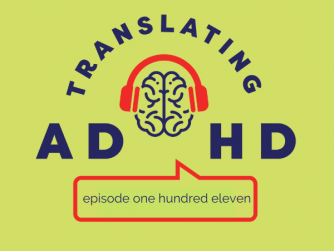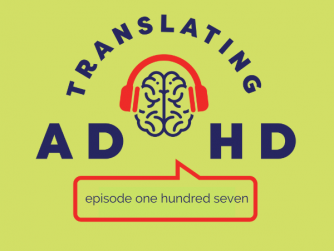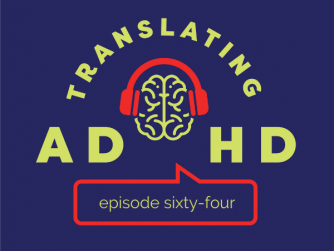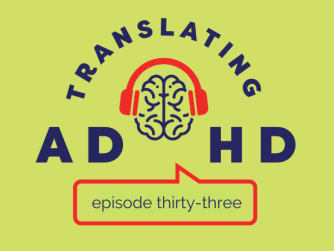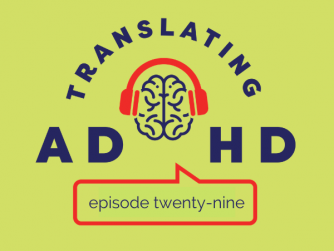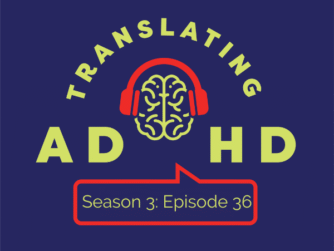In this podcast episode, hosts Ash and Cam discuss the third barrier of ADHD, which is learning. They emphasize how this barrier aligns with the stages of coaching: awareness, action, and learning. They also discuss how ‘pulling the learning forward’ is so hard with ADHD but necessary for sustained change and growth.
Cam addresses his concerns about the quality of coaching in the ADHD community, cautioning against quick-fix approaches and promoting a genuine coaching process. He emphasizes that like any good coaching engagement, coach training programs should have a robust experiential element.
Shifting to the topic of learning, the hosts share insights into the coaching journey, highlighting the importance of curiosity, detachment from outcomes, and client-focused engagement. Ash and Cam discuss how the third barrier can be the most difficult to overcome with false starts and dropped practices. They also share how learning is key to creating real change with ADHD.
They both share client stories of struggle and eventual nuggets of learning. They conclude by encouraging listeners to be wary of promises, fixed-time programs, and coaches who talk more than they listen.
Episode links + resources:
For more of the Translating ADHD podcast:
- Episode Transcripts: visit TranslatingADHD.com and click on the episode
- Follow us on Twitter: @TranslatingADHD
- Visit the Website: TranslatingADHD.com
Episode Transcript:
[00:00:00] Ash: Hi, I’m Ash. [00:00:08] Cam: And I’m Cam. [00:00:09] Ash: And this is Translating ADHD. So Cam, what are we talking about today? [00:00:15] Cam: So Ash, today we’re talking about the third barrier of ADHD. And so we did an overview a couple of weeks ago we dug into the first barrier which is awareness. The second barrier is action. This week we’re looking at the third barrier, which is learning. And what you and I have been emphasizing is that the barriers of ADHD, getting to awareness, getting into action, and getting to new learning line up exactly with the stages of coaching.My coaching is an experiential learning model where we develop awareness of what we’re trying to do. We develop practices and field work to test and try things. And then we spend time with the client to extract the learning from that experience. So, the third barrier is often overlooked by both coaches and clients. And we’ll get into that a little bit later.
The other thing we wanted to do is last week, we were promoting your coaching. This week, we’re promoting mine, but I want to take the conversation to a higher level. And if you’re interested in my stuff, you can find more out about me on CameronGott.com because I have a lot going on. I mean, just I’m doing a lot, and it’s easier, I think, to find stuff on the website. So, if you’re interested, you go there. My newsletter is there. So lots of different things there, but I want to take the opportunity to ask to talk about them. Coaching in general.
And if you’re thinking about hiring a coach, Ash and I are two coaches that are out there. What we do might resonate with you. Other coaches are out there, but something got my attention actually, I just wanted to address. I thought it was a good time to do that. And it’s something we bump into all the time with coaching.
So I’ve been coaching, I’ve been training coaches since 2006. I’ve been around a bit and with the added interest uptick in diagnoses, the interest in ADHD, then you have more interest in coaching, getting help along with that. I see stuff out there that I’ve seen for years and years of this frustration with services that people call coaching and how it isn’t working.
And so I just wanna take this moment, Ash, to talk about that. You know, if you think about if you’re gonna someone work on your car, have a procedure, you know, some minimal surgery, right, you wouldn’t have someone who’s never actually done it. You wouldn’t have someone who hasn’t practiced it. If you’re going to have a heart surgeon, if you’re going to have a brain surgeon, if you’re going to have someone who’s just doing again, minimally invasive surgery, you want to know that they are skilled, they’re certified, and they have some experience. They’ve done it. Someone’s going to work on your car. You’re not going to drop your car off at someone who’s like watched a YouTube video and that’s it. You want to know that they have some experience.
Coaching is the ultimate way experiential model, right? The barriers that we’re talking about are experiential in the sense of identifying what you want to do, doing it, having the experience, coming back, and learning from that experience that is baked into the coaching process. Because there are people that are out there who just are very careless with the term coach. It is, it’s anyone can call themselves a coach.
Something that got my attention is someone who is well known, and they’re putting out a six-week course where they’re talking about becoming a certified coach in six weeks. That’s not possible. Right. You wouldn’t work with a heart surgeon who’s done a six-week tutorial and much of it is, again, watching it. I know how these programs are, and they’re built for volume, and they’re not built for quality.
So coaching is learned by doing. By getting in and working with individuals and getting feedback from an experienced mentor trainer. It is a process that, think of it like any kind of graduate program, which is a 2-year commitment. I do not recommend anyone work with anyone who has, excuse me, not had some real experience. And so, yes, it’s like, well, wait a second. How do you do this? The student coaching. There is student coaching, and those students need to let their clients know where they are. To be transparent.
But this sort of thinking that, oh I’m interested in this, and this person’s story resonates with me. Therefore, I’m going to sign up for their program and become a coach. And just, again, sit back and watch a couple of videos, maybe do an assessment, but not get in the hours of the actual practice.
So it is a buyer beware. The other thing that upsets me – is disappointing – is they’re preying on a very vulnerable population, right? Is that when we think about people when they learn about their ADHD, and they are in a place of desperation? I need help. I need help right now. And what do we do? We reach for the closest thing.
And so it is listeners, it’s on you to take your time to allow this to be a process of learning. To discover coaches, right? And interview coaches to see, do they have your best interest at heart. Do they listen more than they talk? Have they enrolled in a legitimate coaching program?
[00:05:50] Ash: Yeah, I will add to that. The question I always ask people to ask a prospective coach ADHD coach or not, by the way, is tell me about your work with your coach. And by the way, I advise new coaches in the same way. Hire a coach that you admire. Do your work. I think it’s insane – that’s not the right word – there’s something that bothers me about a coach who has never engaged in the coaching process themselves.Cam, being on the client side of things was one of the best teachers I had along the way in my coaching practice. And not just because excellent coaching was being modeled for me every time I showed up to one of our sessions, although that certainly did not hurt, and it helped in several cases, but what was important is seeing this change process play out for myself. I believe in this work because this work changed my life and changed my relationship with my own ADHD. And I just can’t imagine hanging out a shingle and calling myself a coach without having had that experience for myself.
And by the way, there are lots of ways to heal. I have not regularly worked with a coach in many years, probably since you and I stopped coaching together, Cam, although I have engaged coaches here and there for different things. So I’m not saying that coaching is the only way to heal or that coaching has to be a prominent part of a coach’s story. But you wouldn’t be in therapy. Why would you hire a coach who doesn’t believe in coaching as a model for change?
[00:07:43] Cam: That’s a great way to put it, Ash. And it is, I think that it’s this ignorance in the sense of people not doing due diligence to understand what coaching is. It’s a term that is thrown around. And so anyone can use it, right? Just sort of slap it on there.So listeners, we’re taking a little bit of time out today to talk about this, and it’s unfortunately, it’s really on you to take your time. And as you explore coaching that, yes, it starts with a story that resonates. But then, as you dig in, if they’re calling themselves a coach, do they subscribe to a coaching process? Right?
This, again, is an experiential model. And what I mean by that is, it’s like, certain things work well when you it is experiential, like, I say that because my dad was a heart surgeon, but he was also a heart surgeon teacher. He taught surgery and that was the thing that he loved to do more than anything. He helped develop great heart surgeons. He subscribed to this idea of letting them watch him and then start to put the tools in their hands, all the while being fully respectful of the patient and the patient’s needs.
And the same thing could be said about coaching, which is that we develop these, again, scenarios where it’s safe for everyone, especially the client. So it’s that transparency of a coach who’s willing to share with you their experience. And to set expectations. If they are a student coach the pricing should reflect that.
And so there are also some organizations out there that can be very helpful. One in particular is ADHD Coaches Organization, that is www.ADHDcoaches.org. So that is an organization. I just spoke to that group because they support coaches and the development of coaches. And so it is one place where you can, again, find some consistency and excellence. They’re out there.
But anyway, we’re going to go ahead and shift on to this the barrier of learning. And it is, it’s sort of, It folds right into the conversation we were just having. So back to this idea of the three barriers, and this is the barrier that is often overlooked.
Again, with ADHD, we are focused on the big signal, the thing I have to do. Urgency or ARC has us thinking about all the things we need to do. We get it done and we move on and we have to move on quickly. So as we move on quickly, we can miss the details at the latter end of any. Experience project meetings and often the learning is in the last little bit of an experience or an event and we’ve already moved on.
Learning is the nuance. It is the thing that is not necessarily pulled forward. So, listeners, you think about, like, I, you know, I put a system in place. It works for about two weeks and it starts to fade. Start an exercise regimen for two to three weeks, and then it fades. This is specific to ADHD. It’s also specific to, again, this third barrier, which is that after two weeks, the novelty is worn off, the interest is starting to fade, and we need to have that learning aspect to start to synthesize key nuggets to then apply going forward.
So this is this process of developing awareness of a need for change, engaging with that change, and then it’s this back-end work. This is the back-end piece, that when you invite clients to come and share their learning to park the shame and blame at the door, to reserve judgment, there are amazing nuggets and knowledge to be had there. And a good coach is going to support you at all three barriers.
[00:11:44] Ash: Cam, we’ve talked about how clients show up differently at the start of the coaching process versus when they’ve been at it for a while, and they’ve had some practice at it. One of the cool things I notice with my clients who have been at it for a while, or oftentimes my clients who have moved on from coaching but will come back for a session or two, is they’re coming for the learning.They’re eager to learn. I had this dilemma, I had this scenario, I have this, I have that, this is how it went, and I want to understand what that was. Help me get the learning. It’s such a flip from where clients start, help me get to the action, help me be consistent, and help me solve my ADHD. It’s like this subtle perspective shift that happens over time where my clients themselves are just learning to approach everything with more curiosity. Even when it doesn’t go their way.
I had a whole client session a week ago with a client I’ve been with for a long time. I was like, I don’t understand what happened here, and I want to. So we were breaking down a series of events that happened for this client to try and figure out what was going on. What can we learn from this, and is what she suspects true, is that true? You know, she came in saying, I know this and that about my ADHD and my patterns. The, is that what it is? Or is it something else?
So do you hear that questioning her assumptions? And appreciating the process and not attaching it in any way. Let’s just sift through it and see what we might find.
[00:13:23] Cam: So there’s a few things to reflect there, just to pick up on, in the sense of detaching from outcome, journey thinking and this appreciation. There is a process. So people with ADHD can struggle with appreciating the process. And with the big signal and the urgency of, I got all these things to do, get them done, and then we’re done. So, these transitions of sort of coming off the backside and, like, taking that learning and applying it forward. It’s something that is developed in a coaching relationship.As you said, people come and it’s like, I have too much awareness. I don’t need more awareness. I need action. I need results. Something I often say to clients is you want results. What about some resiliency and some resourcefulness to go along with that? And in the resiliency and that resourcefulness is that ability to resilience bounce back and resourcefulness is to be able to kind of consider just what you were saying.
It’s like that client example, right. A client was being resourceful in coming and being curious about the learning. What is the learning that I can extract from this regardless if I was successful or not. So letting go of this whole idea of it has to be successful, right? Perfection, exactness, attached to the outcome of embracing this process.
And it’s the beautiful dance that happens in coaching. And when you show the client some dance steps, you start to kind of do this movement in a way that starts to overcome ADHD wiring. And what I mean by that is that ADHD makes it very difficult for us to look into the future and anticipate it. So this is perspective. Memory is associated with this. It’s also looking back, like looking back and not judging, not having regret or shame or, oh, look how that went wrong. This ability to kind of look back on an experience. Mine the depths of the learning and bring this sort of objectivity to it, recognizing the emotions that are in play and then being able to pivot and apply it forward.
So this, a coaching session is this sort of inflection point in the week where we can come and look together, look back, look for the learning, and then springboard going forward.
[00:15:41] Ash: And Cam, it takes practice as a coach to get better at all of this, too. I had this client who was actually kind of with me. We worked together for a very long time, and she was kind of with me through my growth from new coach to middling coach to excellent coach, a lot of which has happened in the context of our collaboration and the ways that it’s challenged me and helped me grow and fully step into being what we’ve called in the past a big C coach.One of her recurring themes was systems. And every time I would talk to her, it seemed, it felt like she’d have a new system. Classic ADHD behavior, so it seems, right? Here you are in another new system. What’s up with these changing systems all the time? Why can’t we find something that sticks? Do you hear me as the coach internally attaching to some outcomes there? Yeah. Right. Attaching to what’s going on for the client. Not being a hundred percent in my curiosity, which in that case makes a lot of sense. Right. How many times have we talked on this podcast about you were just talking about sticking with something really hard for two or three weeks and then letting it go. Sticking with something really hard for a couple of weeks and then letting it go?
It’s just such a classic pattern. What we discovered over time, and what we couldn’t have gotten to where I was in my coaching acumen at the start of our coaching relationship, is that novelty for this client is an asset. Changing systems supports my client. In taking care of what needs to be taken care of, in being aware of what’s out there, in managing the day-to-day.
And not in that way that we talk about so often, that pattern of setting up this excruciating system that’s so perfect and so detailed, and as soon as it starts to slide a little bit, we let it go. That is an ADHD pattern that’s a struggle for so many of our clients. But for this client, it’s kind of flipped on its head where the novelty of playing with a new tool and seeing what it can do and how it can represent information.
This client is very visual, so kind of always in search of a different or novel or better way to represent a day. Or to represent a series of tasks. And so, changing up the visual representation makes a difference. The novelty makes a difference. And for this client, it’s not a series of, and then it all falls apart and there’s nothing for a long time. It’s a gradual shift out of one system and into another. So, there’s a story of learning, not just for my client, but for me as a coach, because there’s a unique circumstance at play there.
For most of my clients, this type of thing, even if they were telling me, Hey, this, this is what works for me. I would be challenging and questioning that based on what I know about ADHD and the work that I’ve done over many years with ADHD clients on habits and systems and time management and calendaring and all of those things. But it took getting to a certain place as a coach to be able to step back and appreciate, hey, maybe this is your system. Maybe this, what do we, what if we look at this differently and talk about your system being changing systems?
[00:19:15] Cam: So something we do in coach training is we distinguish expertise from the expert. And Ash, what you’re demonstrating there is this. And there’s this, our expertise, our knowledge, right? Our training around for you is originally in organizing and professional organizing. So systems and time, and you have presented on time.For me, I was an educator, right? So that’s my background, and experiential education – teaching skills out in the woods. You know, when you have to make your dinner, and you have no other choice. You know, it gets your attention, right? If you’re out in the woods, you have to set a tent, set up a stove, and cook a meal that is an experiential piece.
And so I bring that what can happen is that people who call themselves coaches see that as permission to just share their knowledge. And this sort of, I know what you need. That’s the expert. I know exactly what you need. The one that drives me crazy is the one it’s like I figured out my ADHD. This is the way I figured it out, and now I’m going to teach you my method. This sort of thinking that I have, I found the key.
I think that’s a hyper-focus thing. That’s a dopamine thing. There’s all kinds of other stuff going on there. Your development as a coach though, right? You’re talking about the type of coach to look for is a coach that’s on their journey, that they’re attending to their growing edge. There’s an appreciation that I’m a new coach. I’m a newbie. I’m starting.
And then that the middling, the middle, the, and this place where you’re starting to get it a bit, it’s like that conscious competence is coming into play. And then again, moving beyond that and that appreciation of we’re all on our journeys, and that modeling. The coach that has the integrity where this appreciation for learning, and that the coach is on their learning journey.
Curiosity is this appreciation of the gap between what we know and what we don’t know. That is at an all-time low right now in the world. Everyone is scared to death and wants to know and have certainty. It’s like that, it’s so refreshing to have the that appreciation we can’t know everything. So this power in the potential of human beings and seeing someone as naturally creative, resourceful, and whole.
And seeing your client as, wow, maybe this is their way to be tweaking and adjusting a system to keep their attention. You said back big C coaching, that is that appreciation as you move from a kind of new coaches start with tracking the what and the when and the where and the how really like, okay, let’s get your goals and let’s start to, let’s get your action list. And it’s about accountability and designing systems. Big C coaching is starting to bring into context, you’re who you are, your sense of self, your why.
For so long, I was coaching, and I was not clear on my why, but I knew enough. It’s like okay. I’m just going to get better at being a coach. I’m going to get better at training coaches. I don’t know anything beyond that because it’s too overwhelming. I get caught up in these little whirlpools and vortices and rabbit holes. And the message that I had was to know what you know, what you’re calling is.
My dad, he knew his calling. That wasn’t me. But again, coming back to be where you are, and through that process, I’ve then determined my calling of this topic here today around raising the quality of ADHD coaching. And it’s offensive, Asher, when I see people taking liberty with the term coaching and saying it to something, making it into something that it’s not. It just roils me to no end. And I know that it’s my own values are being compromised, right? The injustice of that, the unfairness of that.
Interesting topic today. Yes, we haven’t seen, we haven’t seen a Cam rant in some time.
[00:23:27] Ash: It’s all right. We gotta get you riled up every once in a while, Cam, right? Make sure the fire’s still there. [00:23:31] Cam: It’s there. It’s there. Well, what I know is that there are so many good coaches out there at all different levels who really respect and appreciate what coaching is. And not see it as this quick buck thing, this conversion thing. Converting clients, that just drives me crazy. You can convert an ADHD client. That’s kind of a low bar, right? Like someone with novelty and impulse control. You know, great job. What are you doing through the whole process? How are you doing? What are you doing with them for months? What’s the change that you’re engaging with them? That’s the test of a good coach is to be with them, walk with them on their journey. Help them understand the challenges of ADHD so they can identify them, lean into their strengths and leverage change, and identify resources outside themselves.And back to, again, your client, the example of your client, of being able to be resourceful at the moment. To pause, disrupt the negative thinking, and pivot to my experience. How can I learn from this and apply it forward?
[00:24:44] Ash: At a very high level, Cam, I would say, listeners – and this is advice I would give anyone – I would beware any coach who’s promising you any outcomes, or who is putting you through a program that is a set amount of time.I tell new clients four to six months. If you’re not ready to commit to four to six months, you might want to rethink engaging in this process with me. But I don’t require four to six months because at any point for any reason, if the coaching is not supporting my client in the way that they need, what’s the point?
I’m not going to keep taking their money. I don’t want to keep taking their money. It’s not serving them, and it’s not serving me either. So, be very wary of promises of outcome. Be very wary of programs that are fixed in time. And listen for the journey thinking. And the detachment from the outcome. Is it there?
[00:25:36] Cam: Yeah. And I’ll just add one more thing, is that the focus is on you, the client, right? That there’s focus on you and curiosity about who you are, and what matters to you. It’s just that if the person talks more than they listen, it’s a really good sign that it’s not a coaching engagement. They should be demonstrating and modeling coaching right out of the gate. Curious about you and what motivates you, what interests you, what gets your attention, and how your ADHD trips you up. I think that’s a good place to finish up today, Ash. [00:26:07] Ash: I agree, Cam. So until next week, I’m Ash. [00:26:10] Cam: And I’m Cam. [00:26:11] Ash: And this was the Translating ADHD podcast. Thanks for listening.
